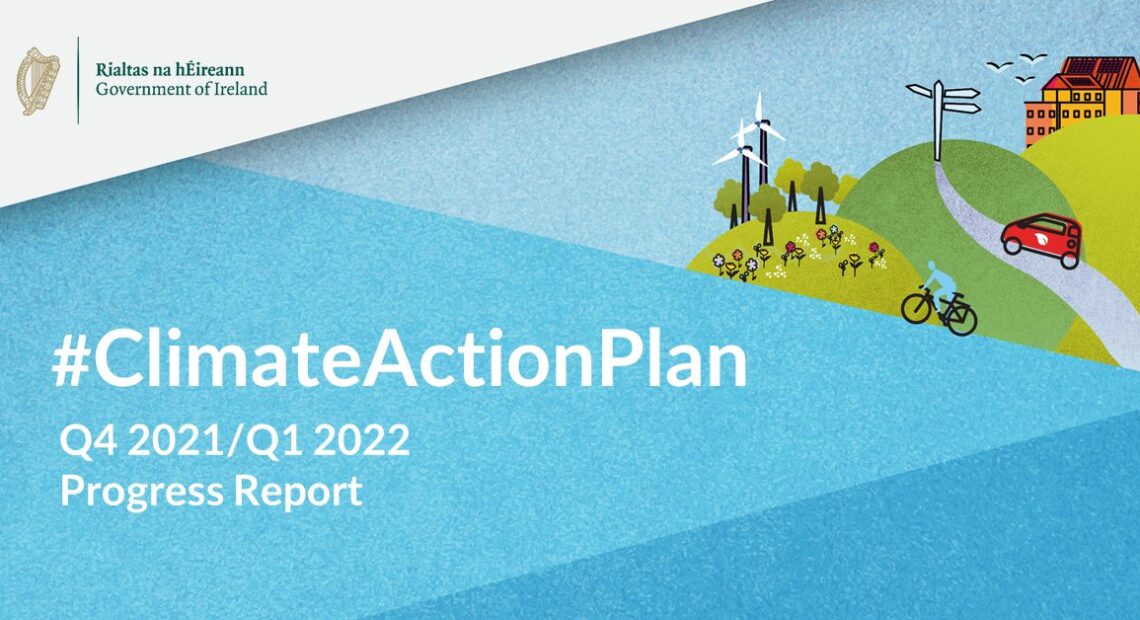The first Progress Report on the Climate Action Plan 2021 was published by Government, detailing progress made on 423 climate action measures due for delivery in Q4 2021 and Q1 2022.
It highlights climate action progress achieved in both quarters, while also emphasising the need to address barriers to implementation.
The challenging nature of climate action delivery remains evident, underscoring the difficult but necessary journey that Ireland has embarked upon by putting ambitious climate action targets into law through the Climate Action and Low Carbon Development (Amendment) Act 2021.
A completion rate of 73% is reported overall, comprising of a delivery rate of 84% on 232 Q4 2021 measures and 59% on 191 Q1 2022 measures. A number of the measures delivered have significant potential for emissions reduction or for increasing Ireland’s resilience to climate change.
Commenting on progress, Taoiseach Micheál Martin said, “we must redouble our efforts to create a cleaner, more sustainable, and climate neutral Ireland, richer in biodiversity, for future generations. The Climate Action Plan is working towards that goal of more resilient and liveable villages, towns, coasts, countryside and cities. We must now further build up capacity to meet the challenges of climate action and close gaps on delivery across the system.”
Minister for the Environment, Climate, and Communications Eamon Ryan welcomed progress on the 2021 Plan, “the actions achieved so far in the 2021 Climate Action Plan set us on the right path towards emissions reduction, but will also lead to a number of social and economic benefits for people across Ireland. This includes more secure energy supplies; better connected transport; warmer, healthier and more comfortable homes; lower energy bills; more sustainable food supplies; greater biodiversity protection; and new job opportunities and resilient incomes for rural and urban communities.”
Tánaiste and Minister for Enterprise, Trade and Employment Leo Varadkar said, “we need to take better care of our planet. This generation should aim to pass it on to the next in a better condition than we inherited it. We have made some progress but our focus over the next couple of years will need to be on implementation. Businesses will play an important role and after what has been a really challenging couple of years, we will help them to make the changes that are necessary, no matter what stage they are at. We want to put forward solutions that make sense for people and their livelihoods.”
The report is structured to highlight sectors with the highest climate impact, to enable better understanding of the measures that will contribute the most to our mitigation and adaptation targets.
The report also highlights a number of measures that were not delivered on schedule, though many are expected to be completed in Q2 2022. Key reasons given for their delay include administrative and capacity constraints; desires for alignment with other measures; technical complexity; stakeholder consultation and the pace of the legislative process.
The report underscores the need to overcome these delays in keeping with the urgency of emissions reduction efforts, legally binding carbon budgets and soon-to-be agreed Sectoral Emissions Ceilings that will set specific emissions limits on sectors. These new Ceilings, and accompanying actions, will be reflected in the Climate Action Plan 2023, due to be published later this year. The implementation challenges highlighted in this Progress Report provide valuable lessons in the development of the 2023 Climate Action Plan.













